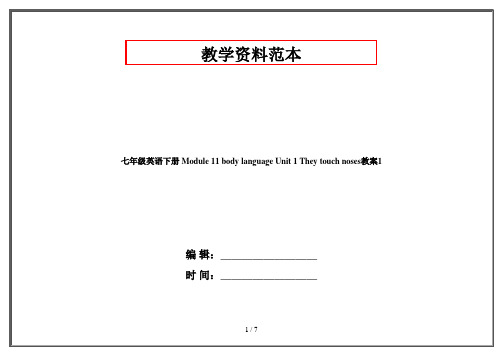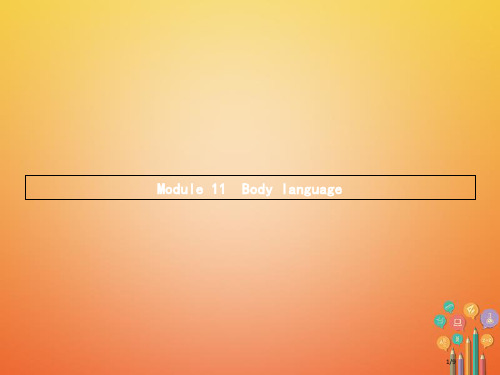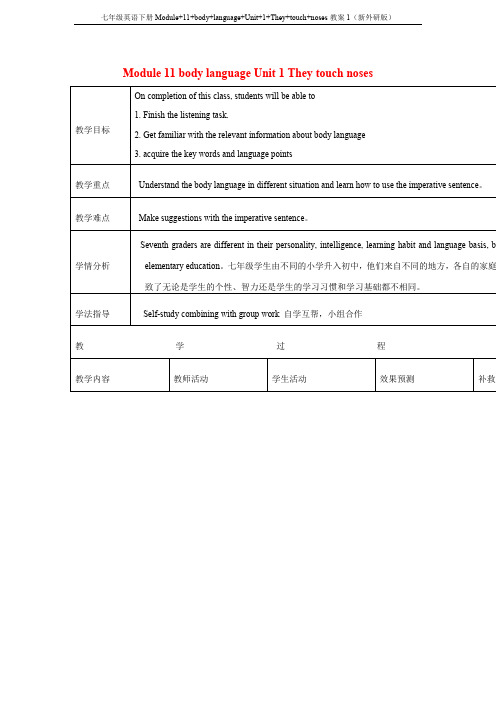七级英语下册ModuleBodylanguageUnitTheytouchnoses同步练习3(无答案)(新版)外研版-课件
七年级英语下册 Module 11 Body language Unit 1 They touche

精选课件
— What do you do and say when you meet your parents after school?
— Kiss and hug each other.
精选课件
A. laugh at
B. smile at
C. laughed
D. smiled at
精选课件
3. each pron. 各个,每个 ◆ In the US some people shake hands, and some kiss or hug each other. ◆ He gave a book to each of his parents. ◆ He gave each boy an apple.
精选课件
【图解助记】
laugh
smile
精选课件
【学以致用】
①Our teacher came into the classroom ______.
A. with smile
B. with smiles
C. with a smile
D. in a smile
②Everyone_______ him when he ran past us.
In (2) _In_d_i_a__, people when they
put their handtsog(3e)ther meet
________ and nod their (6) visitors
heads Russia
________.
In (4) _______, people
七年级英语下册ModuleBodylanguageUnit1Theytouchnoses

刚才史密斯先生点头示意我回来。
第五页,共十六页。
4. each pron. 各个;每个
【点拨】each作代词,意为“各个;每个”。 【辨析】each与every
each和every都有“每个”的意思,但它们在用法(yònɡ fǎ)上有 所不同。
(1)each着重于个别的含义;every着重于全体的含 义,和all的意思相近。如: ①Each student has an English book.
每个学生都有一本英语书。
第六页,共十六页。
②Every student must study well.
每个学生都必须好好学习。
第二个例句中的every student相当于all the students。
(2)以-ese结尾的表示“某国人”的名词是单复数同 形。如:Chinese中国人;Japanese日本人
第二页,共十六页。
2. visitor n. 参观者 【点拨】visitor是名词,意为“参观者”,其复数形式是 visitors。如: Thousands of visitors come to Beijing Zoo at the weekend. 周末成千上万的游客(yóukè)来北京动物园。
Module 11 Body language。(2)以-ese结尾的表示“某国人”的名词是单复数同形。如: visit my grandfather看望我爷爷。常用搭配:nod one’s head点头。(3)every只能用作定语 ,each不仅可以作定语,而且能像名词一样作主语、宾语和同位语。在句中用于一般现在 时态或现在完成时态。【注意】在学习宾语从句时,我们要注意以下几方面(fāngmiàn)的内 容:
七年级英语下册Module11BodylanguageUnit1Theytouchnoses课件新版外研版

In Russia ,people usually kiss three times,left,right,left.
In Japan, people bow.
In India people put their hands together.
And do you know what Maori people do when then meet?
They usually kiss
Russia when they meet? three times ,
left,right,left.
What do people do in
We Chinese often
China when they meet? shake hands and
smile.
Do people shake hands in Yes,they do
二、重点检测(8分) 1.How many times did he drive to school? 2.How often did he go to school? 3-5.BAC 6.are different from 7.is the same as 8.We should help each other and learn from each other.
获
收
编后语
有的同学听课时容易走神,常常听着听着心思就不知道溜到哪里去了;有的学生,虽然留心听讲,却常常“跟不上步伐”,思维落后在老师的讲解后。这两种情况都 不能达到理想的听课效果。听课最重要的是紧跟老师的思路,否则,教师讲得再好,新知识也无法接受。如何跟上老师饭思路呢?以下的听课方法值得同学们学习:
• Step2: Close your books, listen and fill in the forms.(4分 钟)new_jh2_m11u1a3.swf
七年级英语下册Module+11+body+language+Unit+1+They+touch+noses教案2(新外研版)

1、students do the exercise in activity 1.
1、say the words in each picture and repea t the ac tion
1、go through the nationalities in the box and answer the teacher’s questions.
1、 ask other students to answer the question until somebody give the correct answers.
2、the teacher give them an example.
3、play the tape again.
4. ask other students to answer the question and the teacher can give the answers too.
3、Play the recording and tell students to decide which picture is described.
4、check the answers.
1. ask one students to e to the front and act out the words on the PPT, then the other students guess.
四、Act and guess
五、Introduce more about the body language in different countries
六、Homework
1、Ask students to do the exercise in activity 1.
七年级英语下册 Module 11 body language Unit 1 They touch noses教案1

Module 11 body language Unit 1 They touch noses教学目标O1. Finish the listening task.2. Get familiar with the relevant information about body language3. acquire the key words and language points教学重点Understand the body language in different situation and learn how to use the imperat ivesentence。
教学难点M ake suggestions with the imperative sentence。
学情分析Seventh graders are different in their personality, intelligence, learning habit and language basis, because of the different family and elementaryeducation。
七年级学生由不同的小学升入初中,他们来自不同的地方,各自的家庭和以前的学校都不相同,这就导致了无论是学生的个性、智力还是学生的学习习惯和学习基础都不相同。
学法指导S教 学 过 程教学内容教师活动学生活动效果预测补救措施修改意见Step1 Lead –inStep 2. vocab ularyStep 3 activity 1. Review thekey wordsabout humanbody.复习有关人体的词汇,2. learn the newwords。
学习新词汇,播放词汇音频让学生关闭书本在纸上画“正”字测试自己刚才3. teacher showssome bodyaction and askstudents toguess themeaning。
七年级英语下册 Module 11 Body language Unit 1 They touch

8/9
1 bow—3; kiss—1; shake hands—2;smile—1/2/3 2 French—1; Japanese—3; Russian—2 听力原文: Daming:What are they doing? Betty:They’re saying hello.They’re kissing. Daming:Are they German?Or British? Betty:Maybe they’re French. Daming:And these people are shaking hands.I think they’re Russian. Betty:I think so too.And these people are Japanese,I think. Daming:Why? Betty:Because they’re smiling at each other and bowing. 3 1.kiss 2.India 3.together 4.Russia 5.touch 6.vtouch noses!(教材P66)他们互碰鼻子! [解读] touch用作动词,意为“接触;触摸;触及”。 Be careful not to touch the working machine. 当心不要碰触这台工作着机器。 He touched the boy’s head and then gave him a hug. 他摸了摸这个男孩头,然后拥抱了他。 拓展touch名词,意为“接触;联络;关系”。be/get/stay/keep in touch with意为“和……保持联络”。 Goodbye,everyone.Stay in touch! 大家再见。保持联络! With QQ,people can get in touch with each other. 人们用QQ能够彼此联络。
七年级英语下册 Module 11 Body language Unit 1 They touche

完整版ppt
18
Lingling: What! No, I didn’t know that. We Chinese
often shake hands and smile when we meet visitors, and sometimes we nod our heads. But we never kiss. Only parents and children do that.
teachers at school tomorrow, and I’m welcoming the visitors. How do I do that?
Betty: Lingling. you know, in Russia, people
usually kiss three times, left, right, left.
完整版ppt
8
Chinese way
Shake hands and smile
完整版ppt
9
Kiss three times Russian way
完整版ppt
10
American way
shake hands, kiss or hug
完整版ppt
11
Indian way
Put hands together and nod heads
2
hug wave
smile
various ways of greeting
nod bow touch
kiss
完整版ppt shake hands
3
smile 完整版ppt
4
shake hands
完整版ppt
5
bow
七年级英语下册Module+11+body+language+Unit+1+They+touch+noses教案1(新外研版)

Module 11 body language Unit 1 They touch noses教学目标On completion of this class, students will be able to1. Finish the listening task.2. Get familiar with the relevant information about body language3. acquire the key words and language points教学重点Understand the body language in different situation and learn how to use the imperative sentence。
教学难点Make suggestions with the imperative sentence。
学情分析Seventh graders are different in their personality, intelligence, learning habit and language basis, be elementary education。
七年级学生由不同的小学升入初中,他们来自不同的地方,各自的家庭致了无论是学生的个性、智力还是学生的学习习惯和学习基础都不相同。
学法指导Self-study combining with group work 自学互帮,小组合作教学过程教学内容教师活动学生活动效果预测补救措Step1 Lead –inStep 2. vocabulary Step 3 activityStep4 Listening and Reading 1.Review the keywords about humanbody.复习有关人体的词汇,2. learn the new words。
学习新词汇,播放词汇音频让学生关闭书本在纸上画“正”字测试自己刚才3. teacher shows somebody action and askstudents to guess themeaning。
- 1、下载文档前请自行甄别文档内容的完整性,平台不提供额外的编辑、内容补充、找答案等附加服务。
- 2、"仅部分预览"的文档,不可在线预览部分如存在完整性等问题,可反馈申请退款(可完整预览的文档不适用该条件!)。
- 3、如文档侵犯您的权益,请联系客服反馈,我们会尽快为您处理(人工客服工作时间:9:00-18:30)。
Unit 1 They touch noses
一.单词拼写。
1. The v________ to your school is from USA
2. Don’t t_________ the electricity, it’s dangerous.
3. R________ is on the north of China.
4. The new bridge is built by ______ (德国人)
5. The camera is made in _________(日本).
6. Tom is from the USA, so he is an A___________.
二.单项选择。
1.Mike is ___ English boy.
A. a
B. the
C. an
D. /
2._____ give up(放弃), you’ll be successful.
A.Not
B. Often
C. Never D Hardly
3.When Maori people meet their friends, they usually______.
A.Nod their heads
B. Shake hands
C. Hug each other
D. Touch noses
4.________ people uusually kiss three times, left, right, left.
A.Chinese
B. British
C. Russian
D. German
5.Bot h the ________ and the ________ are our friends.
A.English; Russia
B. British; Russians
C. British; Russia
D. England; Russians
三.阅读理解。
Many students in China are learning English. Some of these students are small children. Others are teenagers(十几岁的青少年). Many are adults. Some learn at school, others study by themselves. A few learn English language (语言)over the radio, on television, or in films. One must work hard to learn another language. Why do all these people want to learn English? It is difficult to answer that question. Many boys and girls learn English at school because it is one of their subjects. They study their own language and maths and English ... Some people learn English because it is useful for their work. Many pe ople often learn English for their higher studies, because at college or university(大学) some of their books are in English.
Other people learn English because they want to read newspaper and magazines in English.
1. Many students in China are learning English, aren't they? ____.
A. No, they aren't
B. No, they are
C. Yes, th ey are
D. Yes, they aren't
2. If one wants to learn another language well, he must ____.
A. learn at school
B. study by himself
C. work hard
D. study hard
3. The sentence "It is difficult to an swer that question" means ____.
A. that question is not difficult to answer
B. that question is difficult to answer it
C. it is difficultly to answer that question
D. it is hard to answer that question
4. "Their own language" means ____. A. Chinese B. English C. French D. Japanese
5. What's the Chinese of "study by themselves"?
A. 和他们一起学习
B. 自学
C. 向他们学习
D. 通过学习。
